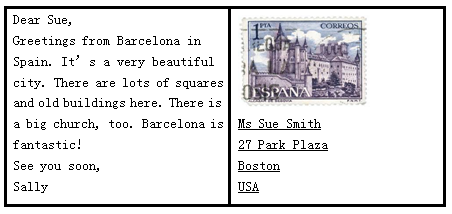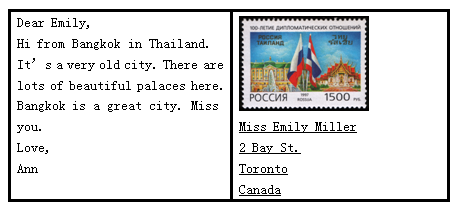题目内容
Do you know something about the Akuapem people? They live in eastern Ghana (加纳), where the sunshine hugs all the time. They are very friendly. Now let’s have a look at how the Akuapem people receive a visitor.
A visitor is often welcomed warmly in a family of Akuapem. After the visitor is welcomed into the house, he is offered a seat and water at the very beginning, for the host (主人) thinks that the visitor must have come from a very long trip and is in need of water. Then the host family greet the visitor by saying “Akwaaba.” More interestingly, if there is a group of visitors, the host will greet the visitors from right to left. And the host shakes only with his right hand, because the left hand is regarded dirty according to the Akuapem people.
Next, the visitor is asked how his trip was and why he has come. While the conversation is going on, the wife and children, especially girls, are cooking food for the visitor. The visitor can choose the food. After the visitor has finished eating, the host and the visitor continue their conversation. Usually this is a short one since the visitor is getting ready to say goodbye.
When the visitor is leaving, he is often given some food to take along. He is also accompanied (陪伴) by one of the children to the nearest station. The child who accompanies the visitor will not come back home until the visitor leaves safely.
No matter if he is a close friend or just a passer-by (过路人), this is always the way that the friendly Akuapem people receive a visitor.
B)阅读表达。阅读第I卷第三大题D篇短文,根据短文内容回答下列问题。(共5小题,计10分)
小题1:What is the visitor offered at first by the family of Akuapem?
______________________________________________________________
小题2:Why does the host shake only with his right hand?
______________________________________________________________
小题3:Who are cooking food while the host is chatting with the visitor?
______________________________________________________________
小题4:When will the child who accompanies the visitor to the station come back home?
______________________________________________________________
小题5:What does the article mainly talk about?
______________________________________________________________
A visitor is often welcomed warmly in a family of Akuapem. After the visitor is welcomed into the house, he is offered a seat and water at the very beginning, for the host (主人) thinks that the visitor must have come from a very long trip and is in need of water. Then the host family greet the visitor by saying “Akwaaba.” More interestingly, if there is a group of visitors, the host will greet the visitors from right to left. And the host shakes only with his right hand, because the left hand is regarded dirty according to the Akuapem people.
Next, the visitor is asked how his trip was and why he has come. While the conversation is going on, the wife and children, especially girls, are cooking food for the visitor. The visitor can choose the food. After the visitor has finished eating, the host and the visitor continue their conversation. Usually this is a short one since the visitor is getting ready to say goodbye.
When the visitor is leaving, he is often given some food to take along. He is also accompanied (陪伴) by one of the children to the nearest station. The child who accompanies the visitor will not come back home until the visitor leaves safely.
No matter if he is a close friend or just a passer-by (过路人), this is always the way that the friendly Akuapem people receive a visitor.
B)阅读表达。阅读第I卷第三大题D篇短文,根据短文内容回答下列问题。(共5小题,计10分)
小题1:What is the visitor offered at first by the family of Akuapem?
______________________________________________________________
小题2:Why does the host shake only with his right hand?
______________________________________________________________
小题3:Who are cooking food while the host is chatting with the visitor?
______________________________________________________________
小题4:When will the child who accompanies the visitor to the station come back home?
______________________________________________________________
小题5:What does the article mainly talk about?
______________________________________________________________
小题1:A seat and water.
小题2:Because the left had is regarded dirty according to the Akuapem people.
小题3:The wife and children, especially girls.
小题4:After the visitor leaves safely. (The child who accompanies the visitor to the station won’t come back home until the visitor leaves safely.)
小题5:How the Akuapem people receive a visitor. (The way that the friendly Akuapem people receive a visitor. )
试题分析:短文大意:这篇短文主要介绍了加纳的阿跨佩姆族人的待客之道。
小题1:细节理解题。根据After the visitor is welcomed into the house, he is offered a seat and water at the very beginning, 描述,可知答:A seat and water.
小题2:根据And the host shakes only with his right hand, because the left hand is regarded dirty according to the Akuapem people.描述,可知答:Because the left had is regarded dirty according to the Akuapem people.
小题3:根据While the conversation is going on, the wife and children, especially girls, are cooking food for the visitor.描述,可知答:The wife and children, especially girls.
小题4:根据The child who accompanies the visitor will not come back home until the visitor leaves safely.描述,可知答:After the visitor leaves safely. (The child who accompanies the visitor to the station won’t come back home until the visitor leaves safely.)
小题5:阅读短文可知,本文主要讲述了Akuapem 人如何接待客人。故答:How the Akuapem people receive a visitor. (The way that the friendly Akuapem people receive a visitor. )

练习册系列答案
相关题目



